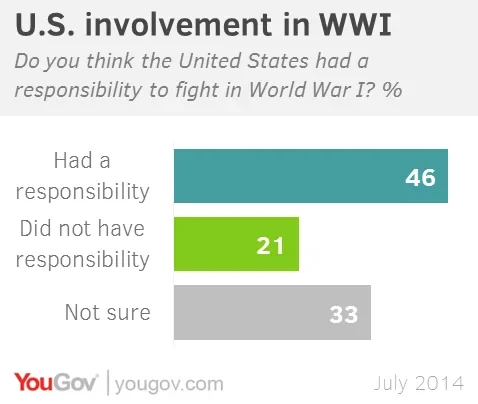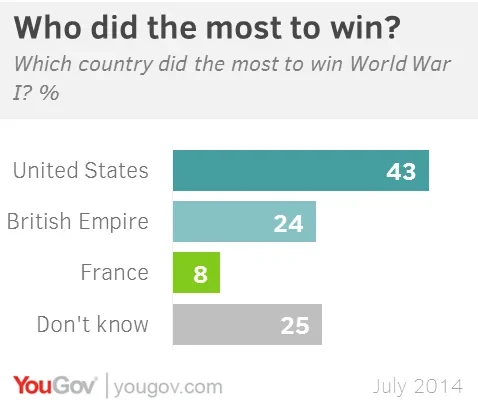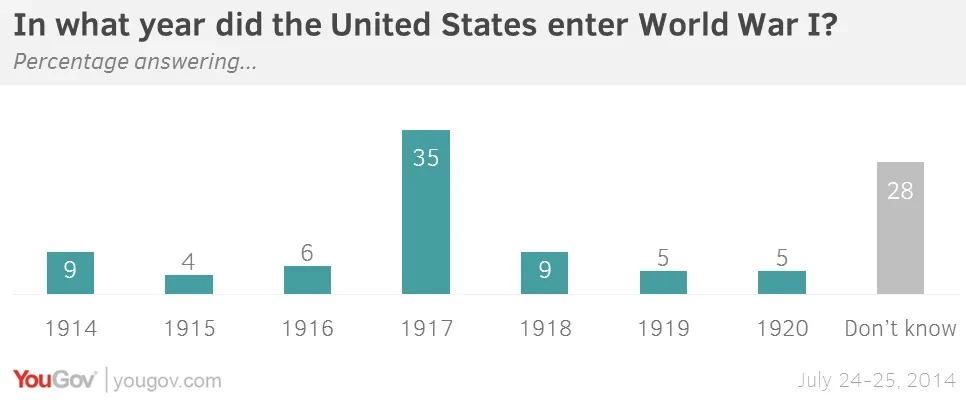Americans tend to say the United States had a responsibility to fight in World War I, but many people struggle to remember some key facts about the war
On July 28th, 1914, Austria-Hungary declared war on Serbia, marking the beginning of the First World War. It would soon become the first truly global war, pitting the Central Powers – including Austria-Hungary, the Ottoman Empire, Germany and Bulgaria – against the Allied Powers – France, the British Empire, Russia, Italy, Japan, the United States and others – in a conflict that would last until 1918, leave millions dead and reshape borders in Europe, Asia and Africa.
To mark the 100th anniversary of the outbreak of WWI, YouGov surveyed Americans on their knowledge of key facts about the war and judgments about the United States’s role in it.
Under half (46%) of Americans say the United States had a responsibility to fight in World War one, while one in five (21%) say the U.S. did not have this responsibility. A third (33%) don’t know.

In this respect, Americans are relatively positive about U.S. involvement in WWI when compared to views about the countries responsibility to ‘do something’ about current conflicts around the world. In last week’s The Economist/YouGov, only 18% said the United States had a responsibility to “do something” about the fighting in Syria. 23% said the same for fighting in Ukraine and 35% said so for the ongoing Israeli-Palestinian fight. A YouGov poll earlier this summer also found that, along with WWII, WWI is one of only two major wars from the last 100 years that the majority of Americans believe to have not been "a mistake".
Many Americans do believe U.S. involvement had a big impact on the war's outcome. Choosing between France, the British Empire and the United States, 43% say the U.S. ‘did the most to win World War I’. 24% think it was the British Empire while just 8% say it was France and 25% don’t know. While deaths are only one measure of the contributions made by countries during the war, US casualties were significantly lower than these two allies. Only 117,000 American soldiers died in WWI, compared to around 700,000-900,000 British military deaths and over 1.3 million French military deaths.

Of course, the United States only joined the war in 1917, after many of the bloodiest battles had already been fought and only a year before the war would end. However, YouGov’s survey found that just a third (35%) answer that the United States entered in 1917 when given a choice of the years spanning from 1914 to 1920. 19% say the country entered WWI before 1917 and 19% say the United States joined after; 28% admit they don’t know.

The majority of Americans correctly answer that it was Woodrow Wilson who was president during World War, when choosing between Wilson, William McKinley (4%), Theodore Roosevelt (12%) and Franklin Roosevelt (8%), who was president during most of WWII. Most people can also place the British Empire (66%) and France (65%) among the Allied Powers and Germany (63%) among the Central Powers; however, most either get the alliance wrong or don't know when it comes to Italy, Russia, Japan, Austria-Hungary and the Ottoman Empire.
Nevertheless, three quarters of the American public agree that the history of World War I remains relevant today. Only 10% think it is no longer relevant.
Toplines of the poll results can be found here. A full demographic breakdown can be found here.







